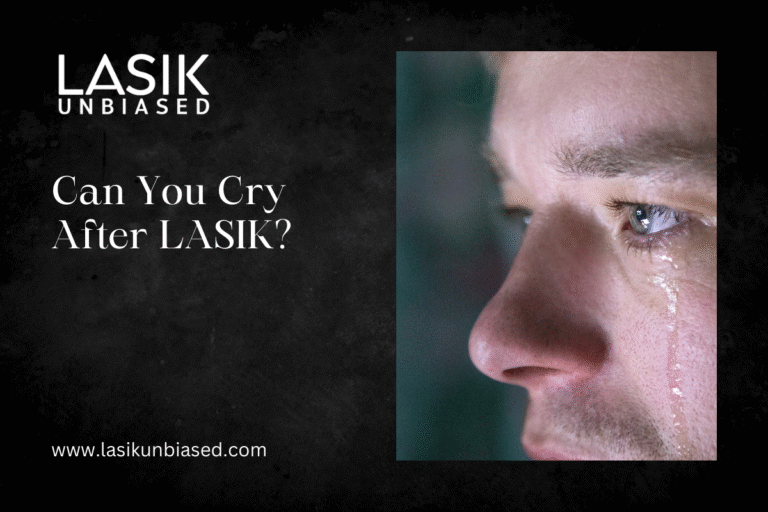Yes, you can cry after LASIK, but it’s important to follow specific post-operative instructions to ensure your healing process isn’t hindered.
Crying itself isn’t harmful to your eyes after the procedure, but how you manage tears is key to avoiding complications.
Why Crying is Safe After LASIK?
Crying is a natural emotional response, and it doesn’t harm your eyes after LASIK because the tear film—a key part of your eye’s defence and moisture system—remains intact following the procedure. While the corneal flap created during surgery needs time to heal, crying won’t disrupt its recovery as long as you follow your doctor’s guidelines.
However, excessive rubbing of your eyes while crying can pose risks. LASIK patients are advised to refrain from touching or rubbing their eyes during the initial weeks of healing to prevent flap displacement or irritation. Tears themselves are sterile and safe, but keeping your hands off your eyes is essential.
The Role of Tears After LASIK
1. How Tears Aid Recovery
Tears are essential to eye health and become even more important following LASIK, as they help soothe and hydrate the eyes during the healing period. Post-operative dryness is a common issue for many patients, and your body’s natural tears or prescribed artificial tears play a crucial role in keeping your eyes hydrated and comfortable. Crying, in moderation, adds to this hydration without causing harm.
Pro Tip: If your eyes feel dry after the procedure, don’t confuse this with the effects of shedding emotional tears. Supplementary lubrication, often recommended by your surgeon, will combat dryness effectively.
2. Good Tears vs Bad Tears
It may sound odd, but not all crying is equal when it comes to LASIK recovery. Emotional tears are generally okay because they flow naturally. However, aggressive or prolonged sobbing, which leads to face-rubbing or applying pressure to your eyes, can endanger the corneal flap.
To protect your healing eyes:
- Gently dab tears away with a clean tissue instead of wiping forcefully.
- Avoid applying pressure to the eyelids or surrounding areas.
3. Dry Eye Syndrome and How Crying Helps
Dry eyes are a common temporary side effect after LASIK, often caused by minor nerve disruption during the procedure. While this condition generally resolves during the healing process, crying may offer temporary relief by boosting natural moisture. That said, speak to your surgeon if dryness persists or becomes uncomfortable, as specialised drops may be more effective than relying on tears alone.
Precautions to Take When You Cry After LASIK
Not all post-LASIK crying scenarios are without risk. Following these precautions ensures your recovery stays on track:
1. Avoid Rubbing Your Eyes
The most significant risk when crying is the temptation to rub your eyes. Even gentle rubbing can displace the corneal flap or affect healing. Remember:
- Resist the urge to touch your face directly.
- Use tissues to lightly blot tears away without pressure.
2. Skip Crying During the First 24 Hours
The initial 24-hour period after LASIK is especially critical to healing. You should avoid emotional triggers that could lead to crying during this time, as the eyes are particularly sensitive. Even innocuous actions like wiping tears may feel uncomfortable immediately after surgery.
3. Use Protective Eyewear
Your surgeon likely provided you with protective goggles or glasses to wear as part of your post-operative care. These should be used when crying is inevitable, as they prevent you from subconsciously rubbing your eyes or touching them.
4. Stay Hygienic
Cry responsibly by maintaining hygiene:
- Use clean tissues to absorb excess tears.
- Wash your hands frequently to avoid introducing bacteria near your eyes.
- Reapply any prescribed eye drops promptly after crying to maintain hydration and reduce inflammation.
The Emotional Impact of LASIK
1. A Common Post-Surgery Reaction
Crying after LASIK isn’t always tied to sadness; it’s often an emotional response to the joy of improved vision. Many patients report shedding tears of happiness when they remove their protective goggles and see clearly for the first time. This moment can be incredibly overwhelming in a positive way.
However, some patients may feel stressed or apprehensive during their recovery. Remember, emotional variation is natural. If feelings of anxiety persist, discuss them with your surgeon or care team.
2. Coping with Post-Surgery Blues
While LASIK benefits are life-changing, the immediate post-operative care can feel restrictive, leading to frustration. Combined with temporary issues like dry eyes or fluctuating vision clarity, minor emotional strain is normal. Crying as an emotional outlet won’t damage your eyes, but ensure recovery remains your top priority.
3. Sharing the Journey
Many patients find comfort in sharing their LASIK experience with friends, family, or online support groups. By connecting with others who have undergone the same procedure, you can normalise your feelings and learn best practices for recovery—including managing tears effectively.
Questions About Crying and LASIK?
1. What if I accidentally cry during the first 24 hours?
Don’t panic. Emotional tears alone won’t harm your eyes, but you should contact your doctor if you accidentally rub your eyes while crying or notice discomfort. Rest and continue following your recovery plan.
2. Can crying cause an infection?
No, crying itself doesn’t cause infection because tears are sterile. However, introducing unclean hands or tissues to your eyes while handling tears can increase the risk of infection. Always prioritise hygiene.
3. Can crying lead to complications weeks after surgery?
By the time you’re several weeks post-LASIK, your corneal flap has typically healed, and the risks associated with crying diminish significantly. Continue to avoid rubbing your eyes, but normal crying no longer poses concerns.
4. What if my vision blurs when I cry?
Blurry vision while crying is temporary and common. Emotional tears mix with the tear film on your eyes, affecting sharpness briefly. This is normal and resolves once tears are wiped away and your eyes re-moisten.
5. Should I worry if I cry often because of dry eyes?
Frequent crying linked to the discomfort of dry eyes should prompt a conversation with your surgeon. Artificial tears and other treatment options can greatly minimise irritation and improve your quality of life.
Moving Forward After LASIK
Crying after LASIK should not be a major concern when managed correctly. Emotional tears won’t damage your eyes, but vigilance around rubbing, touching, and hygiene ensures your recovery remains smooth. By adhering to your post-operative care instructions, occasional crying becomes a harmless part of emotional expression.
Are you considering LASIK or recovering already? Connect with your surgeon to ensure your questions and concerns are fully addressed for a seamless healing process. Clear vision is just the beginning of an exciting, tear-worthy chapter in your life.


